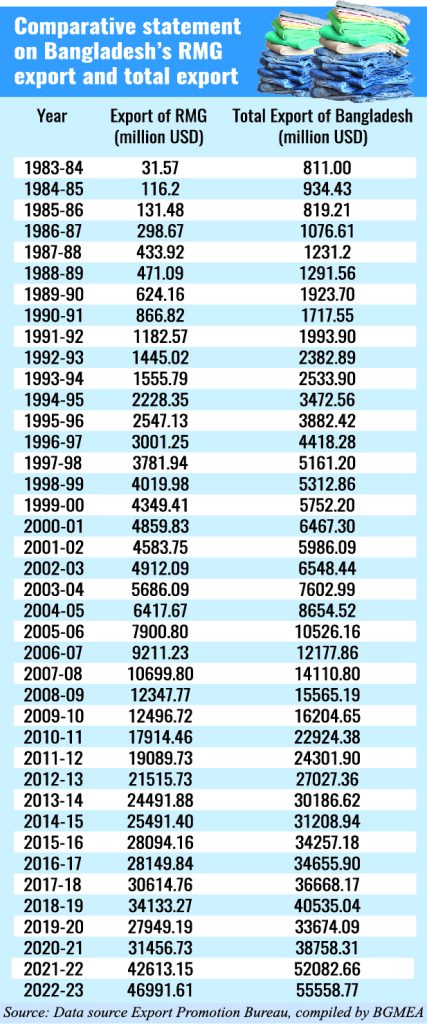Bangladesh’s apparel export industry stands at a commendable $47 billion as of 2022-23, setting a solid foundation for the ambitious target of the Bangladesh Garment Manufacturers and Exporters Association (BGMEA) to become a $100 billion industry by 2030. The journey toward this goal is not without its challenges.
The industry has been witnessing an average annual growth of 8% to 10%, a notable figure, yet reaching BGMEA’s target requires an annual growth rate of 13-14%. The roadmap to this goal involves addressing several pressing challenges while leveraging strong advantages.

The challenges facing Bangladesh’s apparel industry can be categorized into two main groups: domestic challenges and international challenges. Domestically, the industry grapples with the complexity of customs procedures entrenched in bureaucratic red tape. Streamlining these processes and reducing bureaucratic hurdles is vital to facilitating smoother trade operations and expediting the flow of goods. We are at a point where we cannot have any domestic friction on the growth trajectory.
Energy insecurity presents a significant obstacle to growth. Establishing a long-term roadmap for energy prices and ensuring a reliable energy supply is critical to sustaining growth and competitiveness in the apparel industry. Fast completion of national infrastructure projects such as several under-construction power plants, Matarbari Deep Seaport, and Dhaka-Chattogram 8-lane highway are essential for enhancing energy security and lead time advantage.
On the international front, Bangladesh faces challenges as it prepares to graduate from its Least Developed Country (LDC) status in 2026. Renegotiating Free Trade Agreements (FTAs) with individual nations post-LDC graduation becomes essential to secure favorable terms and maintain competitive advantages in the global market. Maintaining stability in key markets, particularly the USA and EU, is paramount while continuously opening new market opportunities. Navigating geopolitical issues carefully is crucial to safeguarding trade relationships and market access with these vital partners.
Additionally, ongoing discussions regarding Human Rights Due Diligence introduce another layer of complexity. It’s imperative to ensure that policies hold all stakeholders accountable. Suppliers are already burdened with numerous audits and certificates, and adding further pressure could render many businesses unsustainable. Negotiating policies that balance accountability and feasibility is essential to ensure the industry’s long-term viability while upholding human rights standards.
Looking deeper into our industry reveals operational micro issues, highlighting the need for sustainability. This requires financial backing for recycling initiatives to prompt factories to embrace sustainable practices. Addressing the chronic shortage of workers is essential, as many factories operate under capacity due to this scarcity. Investing in research and development, particularly in Man-Made Fiber (MMF) production, is critical to bridge the gap with global standards. Diversifying product offerings beyond basic garments to include high-value products is essential for long-term profitability and market expansion.
Last but not least, although Bangladesh has become the world’s most sustainable apparel industry in terms of infrastructure, it has failed to garner enough attention globally. Enhancing branding and marketing efforts is crucial for showcasing Bangladesh’s advantages on the global stage and increasing demand for Bangladeshi products.
In short, navigating major challenges while fixing internal problems and implementing solutions quickly will pave the way for Bangladesh to realize its $100 billion apparel industry goal by 2030. This requires vigilant leadership and fast execution. Not only is the growth important for the RMG industry, but it is also significant for the trade and economic balance of the whole country. Hence, the utmost priority to this industry is in the country’s best interest.
Abrar Hossain Sayem is the CEO of Merchant Bay Inc. and director of Sayem Group. He has been in the RMG manufacturing business for a decade and has been working on creating digital solutions for apparel supply chains for the last 3 years. He also worked with over 150 young RMG leaders to create a shared knowledge base while branding the industry to the world.
sayem@merchantbay.com